
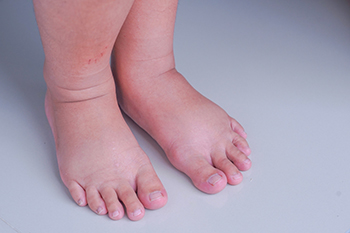
Having swollen feet is uncomfortable. There are various reasons why this condition can happen, ranging from pregnancy to eating foods that are laden with sodium. Swollen feet can also be accompanied by skin that is tight, puffy, and shiny, and depending on its severity, may cause difficulty in walking. Additionally, there may be existing medical conditions that can lead to having swollen feet. These can include heart failure, kidney disease, or venous insufficiency. Swollen feet may happen from having a sedentary lifestyle, and it can be helpful to include gentle exercise into the daily routine. Pregnant women may wish to reduce sodium intake and drink plenty of water daily may help to combat swollen feet and ankles. If you have swollen feet, it is suggested that you confer with a podiatrist who can offer additional methods.
Swollen feet can be a sign of an underlying condition. If you have any concerns, contact Dr. Thomas Tran of Southwestern Foot & Ankle Associates, P.C.. Our doctor can provide the care you need to keep you pain-free and on your feet.
Swollen feet are a common ailment among pregnant women and people who stand or sit for extended periods. Aging may increase the possibility of swollen feet and patients who are obese often notice when their feet are swelling too. There may be medical reasons why swollen feet occur:
Swollen feet can also be caused by bone and tendon conditions, including fractures, arthritis, and tendinitis. Additionally, there may be skin and toenail conditions and an infection may cause the feet to swell. Patients who take medicine to treat high blood pressure may be prone to getting swollen feet.
Many patients elevate their feet to help relieve the swelling and this is generally a temporary remedy. When a podiatrist is consulted the reason behind the swelling can be uncovered and subsequently treated.
If you have any questions please feel free to contact our office located in Frisco, TX . We offer the newest diagnostic tools and technology to treat your foot and ankle needs.
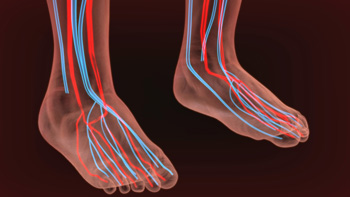
Poor circulation is what podiatrists call a condition where blood does not easily circulate to, through, and from the feet. There are many things an individual may consider doing while consulting with their podiatrist that can help to increase circulation in the feet. For example, a medical professional may make the determination that performing a foot massage could mitigate poor circulation. Performing a specific type of foot massage is essentially a method that can stimulate the muscles. In addition to potentially improving circulation, having a foot massage done can also be a way for a patient to analyze their feet for any potential concerning signs. If you struggle with poor circulation in the feet, it is suggested that you contact a podiatrist about foot massages.
Poor circulation is a serious condition and needs immediate medical attention. If you have any concerns with poor circulation in your feet contact Dr. Thomas Tran of Southwestern Foot & Ankle Associates, P.C.. Our doctor will treat your foot and ankle needs.
Poor Circulation in the Feet
Poor blood circulation in the feet and legs is can be caused by peripheral artery disease (PAD), which is the result of a buildup of plaque in the arteries.
Plaque buildup or atherosclerosis results from excess calcium and cholesterol in the bloodstream. This can restrict the amount of blood which can flow through the arteries. Poor blood circulation in the feet and legs are sometimes caused by inflammation in the blood vessels, known as vasculitis.
Causes
Lack of oxygen and oxygen from poor blood circulation restricts muscle growth and development. It can also cause:
Those who have diabetes or smoke are at greatest risk for poor circulation, as are those who are over 50. If you have poor circulation in the feet and legs it may be caused by PAD and is important to make changes to your lifestyle in order to reduce risk of getting a heart attack or stroke. Exercise and maintaining a healthy lifestyle will dramatically improve conditions.
As always, see a podiatrist as he or she will assist in finding a regimen that suits you. A podiatrist can also prescribe you any needed medication.
If you have any questions please feel free to contact our office located in Frisco, TX . We offer the newest diagnostic and treatment technologies for all your foot and ankle needs.
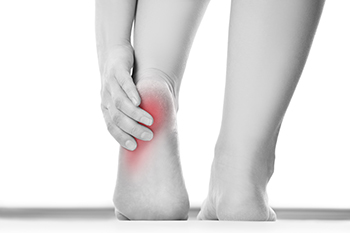
A common cause of heel pain is a foot condition known as plantar fasciitis. This condition affects the plantar fascia, which is the band of tissue connecting the heel to the toes. Plantar fasciitis can cause debilitating heel pain and may gradually worsen until medical attention is received. Intense heel pain can also be a result of Achilles tendinopathy, which is a heel and lower calf injury that happens from overuse. Some people who have peripheral neuropathy have a tingling or numbing sensation in their heel that can be uncomfortable. Rheumatoid arthritis can cause the cartilage to tear in the heel and surrounding area and may cause inflammation, stiffness, and reduced range of motion. If you are experiencing heel pain for any reason, it is strongly suggested that you speak with a podiatrist who can determine what the cause is and offer the correct treatment solutions.
Many people suffer from bouts of heel pain. For more information, contact Dr. Thomas Tran of Southwestern Foot & Ankle Associates, P.C.. Our doctor can provide the care you need to keep you pain-free and on your feet.
Causes of Heel Pain
Heel pain is often associated with plantar fasciitis. The plantar fascia is a band of tissues that extends along the bottom of the foot. A rip or tear in this ligament can cause inflammation of the tissue.
Achilles tendonitis is another cause of heel pain. Inflammation of the Achilles tendon will cause pain from fractures and muscle tearing. Lack of flexibility is also another symptom.
Heel spurs are another cause of pain. When the tissues of the plantar fascia undergo a great deal of stress, it can lead to ligament separation from the heel bone, causing heel spurs.
Why Might Heel Pain Occur?
Treatments
Heel pain should be treated as soon as possible for immediate results. Keeping your feet in a stress-free environment will help. If you suffer from Achilles tendonitis or plantar fasciitis, applying ice will reduce the swelling. Stretching before an exercise like running will help the muscles. Using all these tips will help make heel pain a condition of the past.
If you have any questions please contact our office located in Frisco, TX . We offer the newest diagnostic and treatment technologies for all your foot and ankle needs.
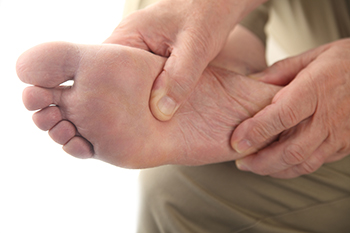
Diabetes can harm the feet and can lead to serious complications. If one has diabetes, there can be loss of feeling in the feet. Because of this, a good foot care regimen is critical. This can include washing, drying, and moisturizing the feet daily. It is important to check the feet each day for abnormalities, such as sores, blisters, or swelling. A hand mirror can help with this if one has trouble seeing or reaching their feet. Walking barefoot is discouraged since it can be easy to step on something and hurt the feet without realizing it. Also, wearing shoes that fit well and do not have linings that may cause friction on the feet is part of a good foot care plan. Additionally, keeping blood sugar levels under control is crucial. If you have diabetes and want to do what you can to make sure your feet are not harmed, it is suggested that you include a podiatrist as part of your medical team for regular examinations and management tips.
Diabetic foot care is important in preventing foot ailments such as ulcers. If you are suffering from diabetes or have any other concerns about your feet, contact Dr. Thomas Tran from Southwestern Foot & Ankle Associates, P.C.. Our doctor can provide the care you need to keep you pain-free and on your feet.
Diabetic Foot Care
Diabetes affects millions of people every year. The condition can damage blood vessels in many parts of the body, especially the feet. Because of this, taking care of your feet is essential if you have diabetes, and having a podiatrist help monitor your foot health is highly recommended.
The Importance of Caring for Your Feet
Patients with diabetes should have their doctor monitor their blood levels, as blood sugar levels play such a huge role in diabetic care. Monitoring these levels on a regular basis is highly advised.
It is always best to inform your healthcare professional of any concerns you may have regarding your feet, especially for diabetic patients. Early treatment and routine foot examinations are keys to maintaining proper health, especially because severe complications can arise if proper treatment is not applied.
If you have any questions please feel free to contact our office located in Frisco, TX . We offer the newest diagnostic and treatment technologies for all your foot and ankle needs.
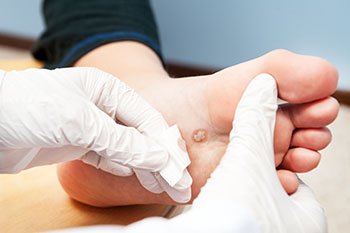
A seed wart can result when an individual comes into direct contact with the human papillomavirus, or HPV. This skin growth can be quite unsightly and typically forms on the bottom, or sole, of the foot. They are characterized by the presence of very small black dots, known as seeds, in the center of the wart. Interestingly, these seeds are not really seeds in the traditional use of the word. Rather, these seeds are actually just tiny blood vessels that have become clotted. Therefore, although these tiny dots might look like seeds, they are in fact just blood vessels. The virus that causes seed warts is extremely contagious and can be spread by skin-to-skin contact and by other means. If you are someone that may have a seed wart, it is strongly suggested that you schedule an appointment with a podiatrist as quickly as possible who can analyze and address your foot problem.
Plantar warts can be very uncomfortable. If you need your feet checked, contact Dr. Thomas Tran from Southwestern Foot & Ankle Associates, P.C.. Our doctor will assist you with all of your foot and ankle needs.
About Plantar Warts
Plantar warts are the result of HPV, or human papillomavirus, getting into open wounds on the feet. They are mostly found on the heels or balls of the feet.
While plantar warts are generally harmless, those experiencing excessive pain or those suffering from diabetes or a compromised immune system require immediate medical care. Plantar warts are easily diagnosed, usually through scraping off a bit of rough skin or by getting a biopsy.
Symptoms
Treatment
To help prevent developing plantar warts, avoid walking barefoot over abrasive surfaces that can cause cuts or wounds for HPV to get into. Avoiding direct contact with other warts, as well as not picking or rubbing existing warts, can help prevent the further spread of plantar warts. However, if you think you have developed plantar warts, speak to your podiatrist. He or she can diagnose the warts on your feet and recommend the appropriate treatment options.
If you have any questions please feel free to contact our office located in Frisco, TX . We offer the newest diagnostic and treatment technologies for all your foot and ankle needs.
Copyright © Southwestern Foot and Ankle Associates, P.C. | Site Map | Nondiscimination | Design by: Podiatry Content Connection